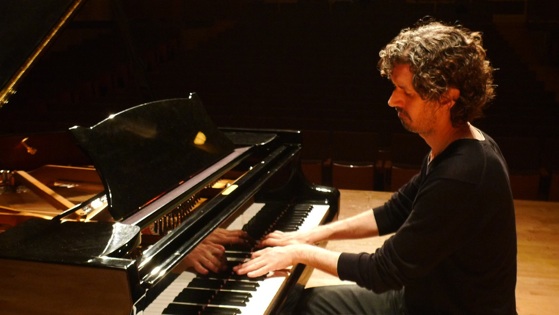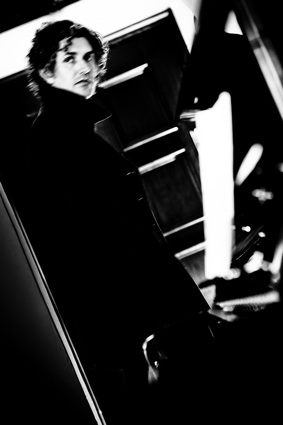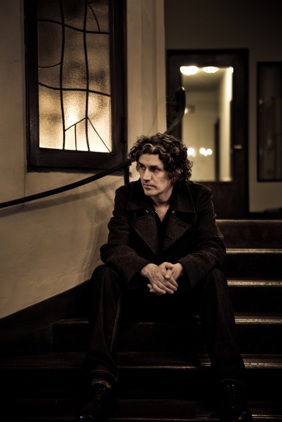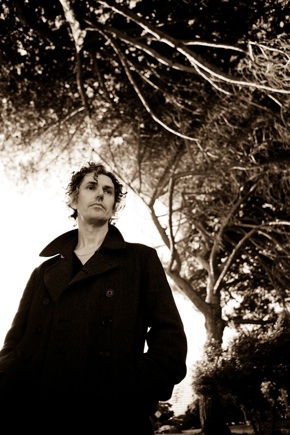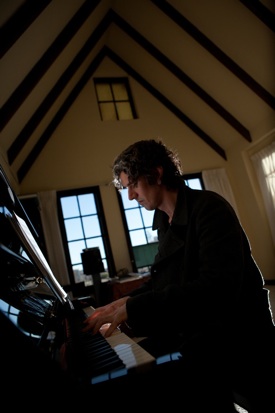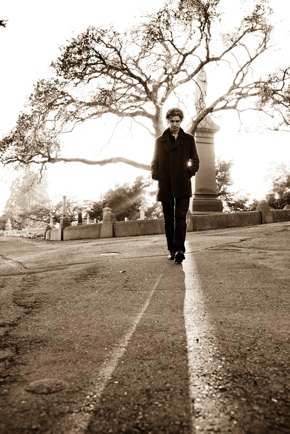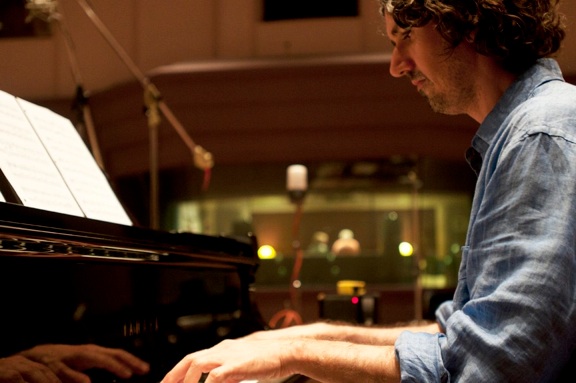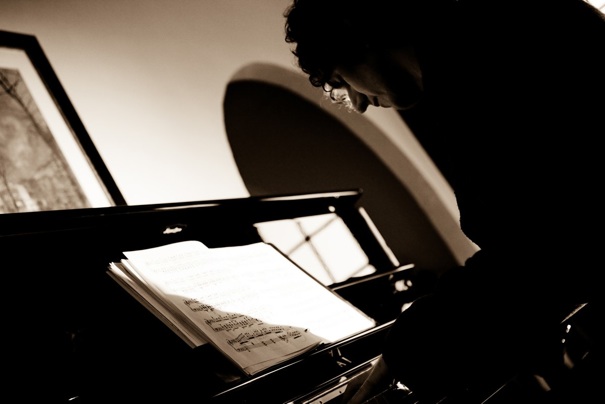What I like most about reviewing CDs is that once in a while something comes through that just blows me away. Christopher Ferreira’s
The Piano Pieces is such a CD. I listened to it many more times than I usually do before writing my review just because I loved the music. I read through Christopher’s website and was surprised to learn that he is in Oakland, CA, my hometown. I commented on that in an email and we were both amazed to discover that we had grown up within blocks of each other! It wasn’t at the same time, though, so our paths never crossed. Still, it’s a really interesting connection! After I finished the review, Christopher asked me about helping him to get his sheet music for
The Piano Pieces ready for publication, so we worked on that as well, and my appreciation for the music grew even more as I played it myself. I was very anxious to get to know Christopher better, and he agreed to this interview. Hopefully we can meet the next time I make a trek to the Bay Area.
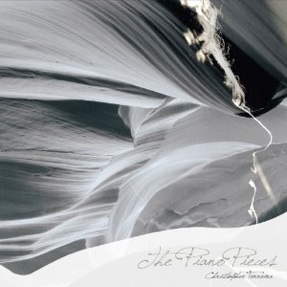
Click the cover to read Kathy's review
KP: Hey, Christopher! How are things in my hometown today?
CF: Hi Kathy! It certainly was unexpected to hear that you grew up in Oakland. It was even more surprising to find out that we grew up only a few blocks from each other!
KP: It’s a “small world” story if I ever heard one! Your recent album, The Piano Pieces, simply blew me away! How long did you work on the project before you were able to release it?
CF: I was so happy to hear that you enjoyed the record! I started writing some of the pieces as far back as twelve years ago. I worked on them intermittently over the years, but in 2009 after finishing the film The Shift, I decided to focus solely on the pieces until they were complete. I think after that it was around two years of refining, practicing, recording and editing etc.
KP: One of my favorite tracks is “A Fragile Campaign.” Did I tell you that when I was reviewing the album I had a dream that incorporated that piece? Pretty strange, but it’s really haunting music. Is there a story behind the piece that would explain the title?
CF: You didn't tell me about the dream, but I would love to hear about it!
KP: As so often happens, I’ve forgotten the dream, but I remember that your music fit perfectly!
CF: I started writing this piece years ago. The opening has always had a kind of nostalgic proud feeling - like a bullfighter. The feeling reminds me of those Picasso ink drawings of bullfights that are on display in the Picasso museum in Barcelona. There is another element to the piece, the high floating melody, that feels like a bird. I was always trying to get the right feeling in the rubato, of struggling to break through, but being pulled back. I imagined a bird trying to push against a strong wind, but unable to gain any ground. At one point I ended up orchestrating this piece for the Berkeley Youth Orchestra. That process really helped me to refine my ideas. I think a lot of that symphonic feeling still remains in the solo piano version I completed for the record. When I was brainstorming titles for this piece, "Fragile" came from the melody for the struggling bird and "Campaign" came from that proud nostalgic bullfighter feeling. I feel the title represents the piece really well.
KP: I do, too. I love those Picasso ink drawings, too! What was the inspiration behind “Waves”?
CF: “Waves” is a very old piece. There are a couple different versions of it that were used in films I have worked on. I don't remember the original inspiration, but most of my pieces originate from a feeling. This piece has a very transparent quality to it. You can put most anything to it visually and it creates a new meaning that somehow works.
KP: Was “Debut” the first piece you wrote?
CF: Not at all! I think "A Minor Waltz" was the first of these piano pieces. "Début" was written for a stage production of The Elephant Man in Los Angeles. It was an amazing production that the director, Ron Marasco, created. It was performed in a black box theatre kind of setting - very minimalistic. He wanted a more intimate feeling for the production, as if it had been thrown together and hosted in someone’s home. The costumes and props were all very simple. The music was all done live on an upright piano and had an old Victorian music hall feeling to it. "Début" was the opening piece, originally called "A Victorian Theatre."
I loved it so much that I reworked it for the album. Since it is very different from the other pieces on the record, I decided to put it first; it really has that "something is about to begin" kind of feeling.
KP: I thoroughly enjoyed working with you to get the sheet music from the CD ready for publication in book form! Do you have a timetable for that project? It will be fun to review that for MainlyPiano.com when it’s ready to go.
CF: I had a great time too; thank you for all of your pianistic insight! I am actually finishing that up right now. The book should be available for sale through my website christopherferreira.com by the end of June! I will send you one when it is all done.
KP: I’ll be looking forward to that! I really love playing your music! When did you start playing the piano?
CF: I didn't really start playing until I was twenty-one or so. As a kid, I loved music. I would play our neighbors’ piano whenever I got the chance. I remember being amazed by the sound of just pressing down the sustain pedal and hitting the keys. In grade school, my best friend and I had a Depeche Mode cover band. I had two synthesizers that sat on ironing boards because I didn't have stands. It was great! He really played piano and would show me what to play. After a while I started figuring out songs on my own. Later, in college I played bass in a band. In my 20's I moved into a warehouse and my friend's parents gave us an upright piano. That was the real beginning I would say.
KP: Did you take piano lessons or are you self-taught?
CF: I didn't actually take a lesson until I was around twenty-five. I realized that I wanted to continue with my writing and playing, but knew I had huge holes in just about every aspect of my technique and abilities as a composer. In the years that followed, I dipped in and out of lessons and studies in an attempt to learn more and acquire more facility at the piano.
KP: Were you a music major in college?
CF: I was actually a theatre major in college.
KP: That’s a surprise! When did you get involved in drama?
CF: In 9th grade I took Drama as an elective. It was lots of fun, so I decided to audition for the musical the following year. Hair was the first one I did. After that, I was sold.
KP: Are you still acting as well as doing music?
CF: I would love to do more acting. For a while, I was doing a bit of acting in indie films, but lately it has been strictly music. I hope to eventually get back into doing live theatre; there is no experience quite like it.
KP: When did you start composing music?
CF: I started composing in college. I was learning guitar and bass, and would come up with simple but gratifying things. I had a Fostex 4 track - a big old heavy thing that went to cassette tapes. It was a lot of fun! Around that time I would do smaller projects - music for a dance project or short film, that sort of thing.
KP: How long were you at the SF Conservatory of Music?
CF: I have taken lessons there off and on for the past six years or so. I have a teacher there that I really like, and the new facilities are great.
KP: Your music has some very obvious classical influences. I hear bits of Erik Satie and Chopin in a lot of your music. Who/what are some of your other influences?
CF: Since I never really studied music as a kid, I didn't have too much exposure to classical piano composers until I was older. For me, music comes from feelings. I sense an odd or abstract or sentimental feeling and try to capture it. My vocabulary on the piano is somewhat limited (though growing all the time!), so many of my compositions manifest in the familiar styles of the composers you mentioned. I do love the work of Ryuichi Sakamoto and Joe Hisaishi, but am not sure if I can take them as influences.
KP: You have scored several films. Tell us about them.
CF: I have done many smaller indie films that you probably haven't heard of. I guess the most mainstream one I did was Illusion with Kirk Douglas back in 2004. I really like some of the music I wrote for that film. The title theme is an older piano piece of mine.
KP: Are those soundtracks orchestrated or mostly piano?
CF: I always start my writing at the piano, so much of the score often has piano in it. Most of the soundtrack work I have done uses computers, piano and synths. I have recorded live strings on top of my synth strings a couple times to give it a more realistic feel. No one has shelled out for the full orchestral score yet, but I am hopeful to one day create a symphonic score.
KP: How did you get into film scoring?
CF: I went to a high school that had an exceptional drama department where I did plays and musicals throughout. I studied theatre in college, but was pulled away from it by music, which I was getting into at the same time. Some of the actors I knew from my circle of friends eventually went on to become directors. This naturally led to a collaboration since we already had a working relationship from the theatre.
KP: Are you able to stay afloat as a full-time musician?
CF: I wouldn't say so! Life is expensive; I don't know how people do it. I think if I was committed to working all the time, I could manage it no problem, but I value quality of life above most else. I also prefer to work slowly, which doesn't always lead to steady and substantial money. I would say that occasionally I can stay afloat, and sometimes I need to seek out other means. I need a patron! ;)
KP: Good luck with that one! Do you have a regular day job, then, too?
CF: I don't have a regular day job, only part time stuff here and there...
KP: Are any of your family members musicians?
CF: Not in the immediate family. My sister and father are naturals though. My father is a gifted singer, and my sister has great pitch and natural rhythm. My great-grandfather on my father’s side was a musician, painter, writer and photographer, but I never heard him play. I do remember his mandolins being around the house though.
KP: Tell us a bit about your early life.
CF: My early life was pretty typical I think. I had school, watched TV, played with my friends - the usual. You mentioned Satie earlier. I just remembered a funny memory. I grew up in the Bay Area, which in the 70's was pretty open-minded about things. I remember in school (I was in 3rd grade, I think) they got a few classes together in the auditorium and tried to teach us to meditate. The teacher played one of Satie's “Gymnopedies” and told us to visualize being at the beach. I remember the music sounded so strange to me. It had such a powerful presence and yet was so unlike anything I had heard before - I remember it really scaring me!
KP: That’s funny! I often think of “Gymnopedies” and “Moonlight Sonata” as being the first “new age” piano pieces! Who are some of your favorite composers?
CF: I love many types of music. Lately I have been listening to a lot of Joe Hisaishi and also Ryuichi Sakamoto. Joe Hisaishi is an amazing film composer. I love all of the Myuzaki films he has composed for, but also some of the smaller films like Departures. Sakamoto is a great pianist and composer. In addition to all the hits, I really like his recordings of Jobim.
KP: I absolutely loved Departures and remember that the music was gorgeous. Who are some of your favorite performers?
CF: I haven't seen too many piano performers play live. I sure like watching Lang Lang play - he gets so into the music!
KP: Is there a particular philosophy that you try to convey in your music?
CF: I wouldn't say I have a philosophy, but I do focus on certain things that are important to me. Having been in theatre and film, I like stories and drama. Those become the important aspects of my music. There is usually a lot of storytelling going on, with different moods that weave through a piece. I guess that makes my music more emotional than intellectual. For me, there is always a visualization of a scene, often with connecting stories involved. Maybe that Satie and the beach actually
worked! "Satie and The Beach" sounds like it could be the name a new Philip Glass opera.
KP: Ha ha! It does! What’s up next for you?
CF: I am composing music for a mini series that is starting out. I can't talk too much out it, but I am very excited and happy to be working on it. I think it is going to be really good.
Many thanks to Christopher Ferreira for taking the time to talk to us! To learn more about Christopher, please visit
his website or his
Artist Page here on MainlyPiano.com.
Kathy Parsons
June 2011

